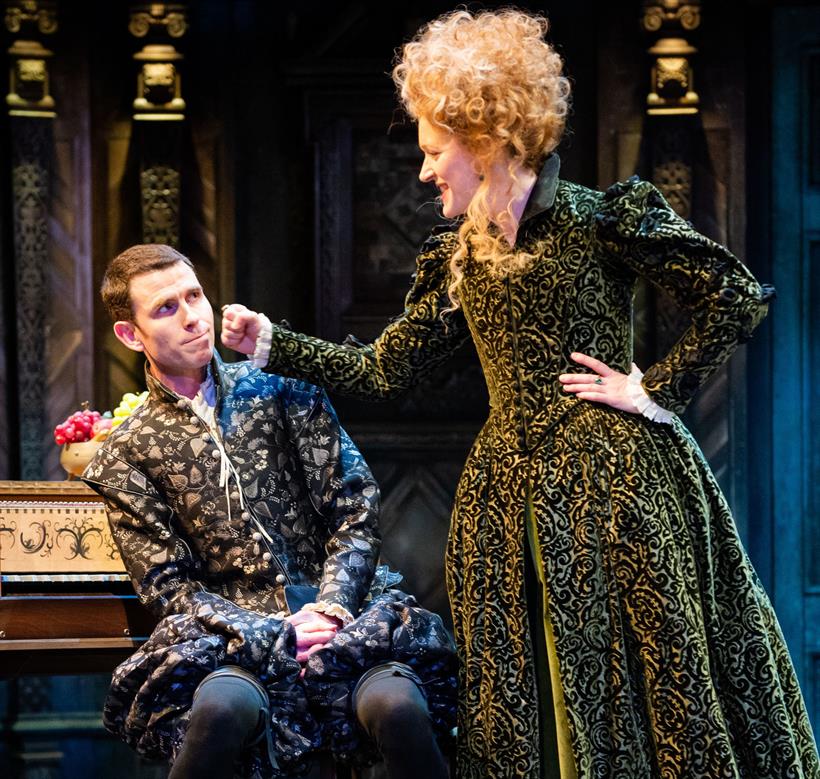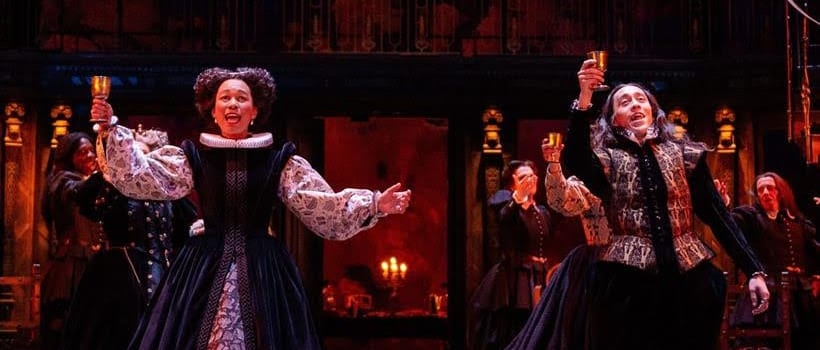The new RSC production of The Taming of the Shrew is eminently worth seeing for all the right reasons and one that is arguably the wrong one. (It also leaves out the contentious prologue or framing device that inspired the approach to creating Kiss Me, Kate but that is another issue.) The right reasons include brilliant directing by Justin Audibert who has welded together his team of actors so that they present a wonderful sense of ensemble, consistency of approach and shared purpose. I have rarely heard the words of Shakespeare so well and clearly spoken and pointed, for one thing; and the sets by Stephen Brimson Lewis and costumes by Hannah Clark are brilliantly evocative of the period in which the play was actually written and are rather beautiful to behold. I was especially struck also by the music of Ruth Chan, its performance, and the movement and dancing created by Lucy Cullingord. The text is clearly and lovingly performed with great intelligence and consistent brilliance, and all the actors deserve high praise. This is the RSC at its best.
The “wrong” reason that is attracting so much attention is that the genders of all the characters are flipped. This is a world in which matriarchy and not patriarchy rules. Baptista is played by Amanda Harris and she has two sons, not two daughters. Bianco is the young, spoiled one, the son who is acceptable to his parent. Joseph Arkley is the petulant, angry and still called Katherine, the male shrew, the more masculine of the two boys and the one who clearly has been psychologically neglected and badly bruised simply by being the less loved. Every other part is reversed in the same way, so that it is Petruchia played by Claire Price who comes to “wive it wealthily in Padua”. Yes, there is an element of subversion that can be stimulating of thought; but it is still a play partly about sexual power and control and Katherine is still abused to bring him into line with the expectations of the society.

So while these reversals of the sexes of the characters certainly make one think again about the text and add a continuous frisson all through the performance, it does not actually fundamentally alter that uncomfortable element of the play that has bothered people much in more recent times. And of course, the ending, where the shrew is seen by his contemporaries to be tamed, is still a special highlight and emblematic of the whole approach. It is also very moving when the tamed Katherine played by Joseph Arkley, with a real understanding of how damaged the character is, does the famous, contentious speech very movingly: “I am ashamed that men are so simple to offer war when they should kneel for peace…”
Everything about the idea is provocative. The performances and mis-en-scene are so clever that one simply goes with this new “given” while watching it. But in the end, I could not buy into it completely. For a start, I wondered if it would have worked better in the “me too” era if it had actually, for once, been updated to modern times when sexual roles and identities are much more blurred and even revolutionary than they were in Shakespeare’s time. For another thing, I have always thought that Shakespeare’s play was not only very enjoyable as it is written but is actually covertly rather subversive even this early in his career, and actually mildly questioning the roles of men and women while portraying the society as it was in his day. Just have a look at the way Elizabeth Taylor acts the last speech in Franco Zeffirelli’s film to understand what I take to be the subtext.
Nevertheless, I loved the acting and the comic timing and really admire the work of Justin Audibert. I would go see anything he directs anticipating a good time. I just found myself wishing that the play could be revived by the same team, but this time with Joseph Arkley as Petruchio and Claire Price as Katherine, not to mention Emily Johnstone as Bianca and James Cooney as Lucentio, and so on.
Give it a try, maybe at your local cinema (5 June 2019) if you cannot get to Stratford.

